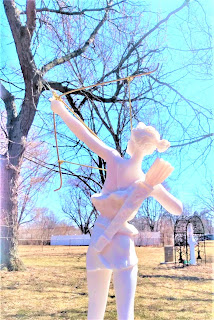Since the annual Festival of Asklepios (Son of Apollon and God of medicine) on the Attic Calendar is tomorrow, and a family member of mine recently made miraculous strides in their battle against pancreatic cancer, I thought talking about the physical and spiritual side of ancient and modern medicine would be a great blog topic, especially since a number of people today think that medical science and religion have to be separate.
I'd first like to talk about my family member, quite close to me, who was diagnosed with one of the deadliest forms of cancer a couple months ago, pancreatic. We were all naturally very concerned, but after a couple rounds of treatment, the tumor is no longer visible, and the stage itself is treatable. So it looks like they're going to be one of the few people who pull through the disease, or who can at least not be killed by it. So it's always great news when someone close to you, or anyone for that matter, finds out that they're gaining the upper hand against such a frightening illness.
The upcoming festival I'm talking about is called Epidauria, and takes place annually on September 18th, in the Month of Boedromion. More or less, it's a Healing Festival of Asklepios that took place in Epidaurus, the believed birthplace of Asklepios, and it was here that the most important sanctuary of Him was built, located on the Northeast of the Peloponnese. During this time, and in Healing Temples in general, people would sleep in these sacred locations to gain the blessings of Asklepios for their illnesses and afflictions, or would bathe in the local natural springs or baths. But these weren't the only methods. There was also a theater, as it was believed that watching good performances benefited health.
But the larger point of this has to do with the fact that, for the ancient Greeks, their Gods were naturally involved in everything they did. They had doctors, just as we have doctors today, but the difference is that these doctors, and the people they treated, did not disregard the essential benefits of spirituality and Divinity. Most certainly, the doctors looked to the natural world to develop cures for the diseases and afflictions they treated, but it was also understood that the natural world came from the Gods, and therefore, so does medicine and healing. What they were given to heal with, were good things, and all good things come from the Gods. That's why the original, authentic Hippocratic Oath begins with an invocation to every single God of the Greek pantheon.
In our world today, people seem to live under the delusion of otherwise, and think that if they support medical science and go to doctors for cures and treatments, that they can't also thank Gods for their recoveries, but even a lot of people today would disagree with that notion. In fact, I would argue that the amazing technology and remedies we have today, have been answers to prayers for healing and disease prevention.
However, that is certainly not to say that traditional remedies, such as those invoked in the Asklepion (Sanctuary of Asklepios), are not beneficial as well. I've said before that a good dose of medicine and spirituality will make you whole again. Because for all of the medical tools we have to draw from today, there is still something inside of us that the mundane cannot heal or satisfy.
If you go to a doctor, or specifically a psychiatrist, and tell them that your religion helps fight your mental illness, or helps you overcome your physical afflictions, they will tell you to keep doing it. In short, keep praying, keep invoking your Gods, keep being spiritual, because it's clearly just as good a medicine for you. They won't tell you to discount their own prescriptions or treatments, but they won't tell you to stop what you're doing either.
If I were to go to an Asklepion today, which I think, would be an exceptionally awesome event to see and experience, and I slept in the temple or sanctuary, the dreams sent to me by Asklepios could not only instruct me on how to heal my illness, but the good dreams themselves can fight depression and stress, improve my neuro connections all together, and strengthen my motor skills. If I bathed in the warm, natural waters of the springs or mineral baths, it could very well improve my blood circulation, which will help prevent something that can be very deadly, blood clots. The baths will also reduce my stress, reduce pain, improve skin conditions, and generally aid in rehabilitation. And if I enjoyed the wonderful performances of the theater with my dear friends or likeminded people, I could also experience a number of the benefits I just described, such as stress relief and improved memory and mood.
As human beings, we are naturally religious and spiritual people. It's part of our genetic and evolutionary makeup. We are meant to connect with Gods and the natural world that is part of them. We need the Gods to be whole and complete. There are some things that a pill or a machine cannot cure, relieve or answer. And just because we advance in a field, doesn't mean the Gods aren't part of that. The ancient Greeks never had cars, but Hermes remains the Gods of travel still, for example. Just as Apollon and Asklepios remain the Gods of healing and medicine, and when the mortal doctors can do no more, the Gods can and will step in, just as they did with my infant son during his premature birth and recovery.
It is a wonderful world, and a wonderful universe, with many wonderful, diverse things, that the Gods have given us to experience and take part in.
In the Goodness of the Gods,
I'll see you at the next Herm down the road,
Chris Aldridge.




